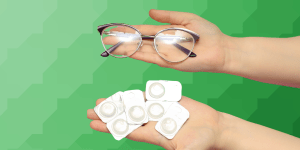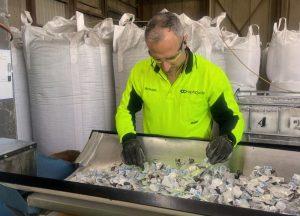1:30min
 Opticycle is making recycling easy for optometrists in Australia, offering a holistic end to end recycling solution for optical products, ranging from contact lens packaging to frames and lenses.
Opticycle is making recycling easy for optometrists in Australia, offering a holistic end to end recycling solution for optical products, ranging from contact lens packaging to frames and lenses.
At the heart of Opticycle’s mission lies a deep commitment to challenging traditional recycling norms and finding innovative solutions for niche waste streams. Founded by The Activ Group and PanelCycle, Opticycle harnesses the collective expertise of its founders in product stewardship, circular economy design and cutting-edge recycling technology.
Helen Jarman, a founder and director of Opticycle, highlights the organisation’s unique approach to developing a recycling solution that addresses the specific needs of the optical industry.
‘Opticycle offers a straightforward yet effective recycling solution for frames, lenses and disposable contact lens cases,’ she explained. ‘Our mission is multi-faceted: to comprehensively capture and recycle all optical waste, ensure easy access for the vast majority of Australians, address multiple waste streams within the optical sector, prevent landfill accumulation and build strong, sustainable relationships with all industry stakeholders.’
Why opt for Opticycle?
Optometrists and practices interested in utilising Opticycle’s recycling solution can easily get on board by ordering a Contact Lens Case Recycling or Eyeglasses Recycling 40L Box or satchel from their user-friendly website. This service includes scheduled collections once the Recycling Box is filled and post-paid returns for the Eyeglasses or Contact Lens Case Satchel, making the process both convenient and hassle-free.
Helen notes, ‘Customers are looking for genuine recycling solutions with an easy process to conveniently send back or drop off their items; at Opticycle, we are the only specialised optometry recycling program in Australia that provides a comprehensive recycling solution. Today, businesses can facilitate recycling by providing collection boxes for customers to deposit contact lens cases, glasses, and lenses. Meanwhile, individuals can order collection satchels from our website to gather optical products at home. Our goal is to expand the program and provide flexibility and accessibility, for both drop-off solutions as well as home solutions that match the user’s behaviour.’
With Opticycle estimating that 250 to 500 million contact lens cases are discarded by Australian’s every year, the importance of a recycling solution in today’s market cannot be overstated.
‘Sustainability is a key factor in customer purchasing decisions,’ she emphasised.
‘Brands that integrate sustainability into their operations can leverage this trend for growth. For optical industry professionals and businesses, it’s crucial to align customer choices with sustainable practices.
‘When choosing a sustainability partner, it’s important to inspect the collection and recycling process, material flow and recovery outcomes, to ensure that these solutions are inspected and validated. This approach not only protects the environment but also mitigates risks for businesses, ensuring sustainability goals are effectively met.’
What happens to contact lens packaging and glasses?
Opticycle assures transparency and traceability in the process, which involves state-of-the-art recycling technology right here in Australia.
‘We ensure that all collected materials are immediately recycled upon receipt at our facility, avoiding unnecessary storage of waste,’ Helen explained.
Contact lenses
Upon arrival, contact lens cases undergo a meticulous process, including sorting, shredding, separating and repurposing into valuable resources.
 ‘Initially, material is weighed and logged into our system for tracking and reporting purposes. The contents of the boxes are then manually sorted by the team to remove any contaminants before they are shredded. This preparatory step is crucial for maintaining the purity of the recycling streams.
‘Initially, material is weighed and logged into our system for tracking and reporting purposes. The contents of the boxes are then manually sorted by the team to remove any contaminants before they are shredded. This preparatory step is crucial for maintaining the purity of the recycling streams.
‘Once sorted, the containers are shredded, breaking them down into finer particles. This is a key step in our proprietary separation process, designed to efficiently delaminate and segregate the materials. The resultant plastic and aluminium are then channelled into the next phase of their lifecycle. We proudly repurpose the aluminium into deoxidant pucks for the steelmaking industry, while the polypropylene finds a new life in the manufacturing of products such as durable pots.’
Eyeglasses
A similar approach is used for frames and lenses.
‘The glasses are carefully sorted to remove any contaminants, which is crucial for maintaining the integrity of the recycling process. The lenses are manually separated from the frames, allowing us to address the different material compositions effectively.
‘We partner with various manufacturers to repurpose them into new and useful products. The mix of lenses and frames is creatively used to produce unique benchtop sheets. Any excess plastics are recycled into innovative, sustainable building materials such as bricks, blocks and eco-aggregates. Meanwhile, the excess metals are sent to refineries for further processing and reuse.’
Get in touch with Opticycle
Opticycle urges optometrists to connect, join their initiative and contribute towards a greener future. For more information or to discuss Opticycle’s recycling solutions further, reach out to Helen Jarman and Jason Rijnbeek at 1800 850 977 or sales@opticycle.com.au.
Tagged as: Sustainability